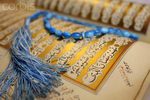“Then which of the Blessings of your Lord will you both (jinns and men) deny?” Why is this Verse repeated 31 times in the same Chapter?….
This is a question that puzzled me for so long; I could not figure out why this particular verse occurs no less than 31 times in the Holy Qur’an and in the same Chapter, namely Ar-Rahman (The Beneficent). Let’s take a look at a wonderful numerical consistency.
Many are the puzzling phenomena that seem to elude us about the Qur’an. Such phenomena are a strong point of argument for people who question the validity of the Qur’an. Many sceptics, for instance, claim that the Qur’an is the written word of Muhammad (pbuh).
When certain verses are repeated many times, such as the verse mentioned above, one argument that sceptics present is that Muhammad used to forget what he wanted to write and therefore repeated the same verses over and over again. Therefore, to apply reason, we will assume that this argument may hold true, and say this: If Muhammad indeed did write the Qur’an and therefore this Chapter (The Beneficent), why then did he repeat this verse a total of 31 times? What is the wisdom behind such repetition, why such a peculiar number, and why isn’t only once enough?
Our belief, of course, is that Muhammad never wrote a single word of the Qur’an; that it is the word of God Almighty, and that He, in his great wisdom, placed secrets within its verses that, if uncovered will reveal an unprecedented miracle for any atheist living on Earth today!
After researching this Verse for some time, I discovered a profound numerical arrangement based on the central number of 7, an assurance that no unnecessary repetition exists in the Qur’an. Rather, it is a miraculously delicate consistency.
The number 7, as noted in previous research articles, has many wonderful implications throughout the Qur’an, and is the basis for all research relating to the Qur’an’s numerical miracle.
Therefore, I observed the Verses of “The Beneficent” where the Verse (Then which of the Blessings of your Lord will you both (jinns and men) deny?”) is repeated, and found that it is first cited in the 13th Verse and last cited in the 77th Verse of the Chapter. This is illustrated below:
The Most Gracious (Allah)! (1) Has taught (you mankind) the Quran (by His Mercy). (2) He created man. (3) He taught him eloquent speech. (4) The sun and the moon run on their fixed courses (exactly) calculated with measured out stages for each (for reckoning). (5) And the herbs (or stars) and the trees both prostrate. (6) And the heaven He has raised high, and He has set up the Balance. (7) In order that you may not transgress (due) balance. (8) And observe the weight with equity and do not make the balance deficient. (9) And the earth He has put down (laid) for the creatures. (10) Therein are fruits, date-palms producing sheathed fruit-stalks (enclosing dates). (11) And also corn, with (its) leaves and stalk for fodder, and sweet-scented plants. (12)Then which of the Blessings of your Lord will you both (jinn and men) deny? (13) He created man (Adam) from sounding clay like the clay of pottery. (14) And the jinn He created from a smokeless flame of fire. (15) Then which of the Blessings of your Lord will you both (jinn and men) deny? (16) (He is) the Lord of the two easts (places of sunrise during early summer and early winter) and the Lord of the two wests (places of sunset during early summer and early winter). (17) Then which of the Blessings of your Lord will you both (jinn and men) deny? (18) He has let loose the two seas (the salt and the fresh water) meeting together. (19) Between them is a barrier which none of them can transgress. (20) Then which of the Blessings of your Lord will you both (jinn and men) deny? (21) Out of them both come out pearl and coral. (22) Then which of the Blessings of your Lord will you both (jinn and men) deny? (23) And His are the ships going and coming in the seas, like mountains. (24) Then which of the Blessings of your Lord will you both (jinn and men) deny? (25) Whatsoever is on it (the earth) will perish. (26) And the Face of your Lord full of Majesty and Honour will remain forever. (27) Then which of the Blessings of your Lord will you both (jinn and men) deny? (28) Whosoever is in the heavens and on earth begs of Him (its needs from Him). Every day He is (engaged) in some affair (such as giving honour or disgrace to some, life or death to some, etc.)! (29) Then which of the Blessings of your Lord will you both (jinn and men) deny? (30) We shall attend to you, O you two classes (jinn and men)! (31) Then which of the Blessings of your Lord will you both (jinn and men) deny? (32) O assembly of jinn and men! If you have power to pass beyond the zones of the heavens and the earth, then pass beyond (them)! But you will never be able to pass them, except with authority (from Allah)! (33) Then which of the Blessings of your Lord will you both (jinn and men) deny? (34)There will be sent against you both, smokeless flames of fire and (molten) brass, and you will not be able to defend yourselves. (35) Then which of the Blessings of your Lord will you both (jinn and men) deny? (36) Then when the heaven is rent asunder, and it bec omes rosy or red like red-oil, or red hide. (37) Then which of the Blessings of your Lord will you both (jinn and men) deny? (38) So on that Day no question will be asked of man or jinn as to his sin, (because they have already been known from their faces either white or black). (39)Then which of the Blessings of your Lord will you both (jinn and men) deny? (40) The guilty will be known by their marks, and will be taken by the forelocks and the feet. (41) Then which of the Blessings of your Lord will you both (jinn and men) deny? (42)This is Hell which the guilty deny. (43) They will go between it (Hell) and the fierce boiling water! (44) Then which of the Blessings of your Lord will you both (jinn and men) deny?(45) But for him who fears the standing before his Lord, there will be two Gardens (i.e. in Paradise). (46) Then which of the Blessings of your Lord will you both (jinn and men) deny? (47) With spreading branches. (48) Then which of the Blessings of your Lord will you both (jinn and men) deny? (49) In them (both) will be two springs flowing (free). (50) Then which of the Blessings of your Lord will you both (jinn and men) deny? (51) In them (both) will be every kind of fruit in pairs. (52) Then which of the Blessings of your Lord will you both (jinn and men) deny? (53) Reclining upon the couches lined with silk brocade, and the fruits of the two Gardens will be near at hand. (54) Then which of the Blessings of your Lord will you both (jinn and men) deny? (55) In them will be (Maidens), chaste, restraining their glances, whom no man or Jinn before them has touched. (56) Then which of the Blessings of your Lord will you both (jinn and men) deny? (57) (In beauty) they are like rubies and coral. (58) Then which of the Blessings of your Lord will you both (jinn and men) deny? (59) Is there any reward for good other than good? (60) Then which of the Blessings of your Lord will you both (jinn and men) deny? (61) And besides these two, there are two other Gardens (i.e. in Paradise). (62) Then which of the Blessings of your Lord will you both (jinn and men) deny? (63) Dark green (in colour). (64) Then which of the Blessings of your Lord will you both (jinn and men) deny? (65) In them (both) will be two springs gushing forth. (66) Then which of the Blessings of your Lord will you both (jinn and men) deny? (67) In them (both) will be fruits, and date- palms and pomegranates. (68) Then which of the Blessings of your Lord will you both (jinn and men) deny? (69) Therein (gardens) will be fair (wives) good and beautiful. (70) Then which of the Blessings of your Lord will you both (jinn and men) deny? (71) Fair ones, close guarded in pavilions; (72) Then which of the Blessings of your Lord will you both (jinn and men) deny? (73) whom no man or Jinn before them has touched. (74) Then which of the Blessings of your Lord will you both (jinn and men) deny? (75) Reclining on green cushions and rich beautiful mattresses. (76) Then which of the Blessings of your Lord will you both (jinn and men) deny? (77) Blessed is the Name of your Lord (Allah), the Owner of Majesty and Honour. (78)
I have highlighted the repeated Verses in blue to make it easier for readers to check these facts for themselves. Counting these Verses, we find that they are 31, and their respective numbers are as follows:
13 16 18 21 23 25 28 30 32 34 36 38 40 42 45 47 49 51 53 55 57 59 61 63 65 67 69 71 73 75 77
Arranging the numbers
It must be noted that in all our research of the numerical miracles, we follow the exact same method of arranging numbers, and that is by placing one number in front of the other, and reading the resulting number as it appears.
That being said, when we arrange the numbers of the 31 Verses shown above, the result is a huge 62-digit number:
77757371696765636159575553514947454240383634323028252321181613
This large number, which represents the Verse numbers where (Then which of the Blessings of your Lord will you both (jinns and men) deny?), is, amazingly enough, a multiple of seven: a whole number with no decimals!
This coherence, to me at least, demonstrates that these Verses were perfectly assembled by God Almighty. Still, however, one may have his doubts. So what is the evidence that this did not simply happen by chance?
Reading from the opposite direction
The Verse we are dealing with talks about mankind and Jinns, and is a reminder for them of the endless blessings of God. Now, reading this 62-digit from the opposite direction; i.e. from right to left, we arrive at the following:
31618112325282032343638304245474941535557595163656769617375777
Incredibly, this number is yet again a multiple of 7! Therefore, to reflect: the figure which represents the numbers of Verses where (Then which of the Blessings of your Lord will you both (jinns and men) deny?) is divisible by 7 in both directions, whichever way it is read. Is this not a powerful indication that no meaningless repetition exists in the Qur’an, but a perfect numerical system instead?
No coincidence in the Qur’an
Still, one may continue to claim that the possibility of coincidence cannot be completely ruled out. Hence, we search further.
At this point, it is crucial to ask: Why 31? Why is this verse not repeated 32 or 30 times? What is the wisdom behind this number? Confronted with these questions, I did a simple experiment. Numbering the repeated Verses in sequential order (i.e. 1-2-3-4…31), I placed the resulting number as shown below:
31-30-29-28-27-26-25-24-23-22-21-20-19-18-17-16-15-14-13-12-11-10-9-8-7-6-5-4-3-2-1
This number is able to divide by 7 .
If we reverse the number will be stay divided by 7 .
12345678901112131415161718191021222324252627282920313
to be perfectly divisible by 7!!
This, for me, erases any doubt as to the possibility of coincidence.
Please note, that in the above example, had the Verse numbers been in any other order (e.g. the first repeated Verse was Verse [12] rather than Verse [13]), the resulting number would have not been divisible by 7, and would have had decimals. Also, had the number of Verses been 30 or 32 instead of 31, all the above numbers would have not been divisible by 7, and would have all had decimals!
31 Again
Another beautiful consistency I noticed relates to the following Verse of the Chapter we dealt with, The Beneficent. It reads: (We shall attend to you, O you two classes (jinns and men)! (The Beneficent: 31). In Arabic, these ‘jinns and men’ are referred to in this Verse in just one word, namely (Ath-thaqalan). It should be noted that this is the only Qur’anic reference to both mankind and jinns collectively in one word. So I wondered: is there any relationship between this Verse and the repeated Verses, which directly address jinns and men?
I realised that that Verse was the 31st Verse of the Chapter! In other words, the number of repeated Verses which directly address jinns and men are 31, and so is the Verse number where they are collectively addressed in one word. Again, we find that this consistency could not have easily arrived by chance.
The Results
To reflect upon our results we found that:
- The 62-digit number comprised of the Verse numbers representing the repeated Verse (Then which of the Blessings of your Lord will you both (jinns and men) deny?) is a multiple of 7, read from both directions.
- The 53-digit number comprised of the numbers 1 through to 31 in serial order, is also a multiple of 7, read from both directions.
- Any arrangement of numbers other than that used above as indicated by the Holy Qur’an would have contradicted this numerical consistency and resulted in numbers that were not multiples of 7 and therefore not whole numbers.
Please note that a normal calculator cannot usually perform such large calculations. In this case, even some scientific calculators may not arrive at a perfect number without decimals. To make life easier for those wishing to crunch the numbers for themselves, we have provided a useful link below that assists in this.
In the end, we can only say that Glory be to Allah for these wonderful miracles. At the same time, we say that all opinions and judgments are respected, regardless of whether readers choose to believe what is presented. In our modest opinion, however, it is only through the wisdom of God Almighty that these numbers were arranged with such perfection, confirming that this Holy Book is not one of repetition, but a profound miracle in every sense of the word. And it is He, God Almighty, who says: (And say: Praise be to Allah who will show you His Signs so that ye shall know them, And thy Lord is not unaware of what ye do.) [Al-Naml (The Ants): 93].
——————–
By: Abduldaem Al-Kaheel
Links
The Million Digit Calculator http://www.comptune.com/calc.php?methos=GET&base1=10&base2=10&S1=1234567890111213141516171819%0D%0A1021222324252627282920313&S2=7&func=bcdiv&base3=10&places=100
Indeed, God Almighty has organised the letters, words, Verses and Chapters of his Book based upon this number, as proof that the author of the Holy Qur’an is in fact the Creator of the seven heavens and the universe.



